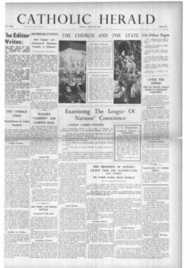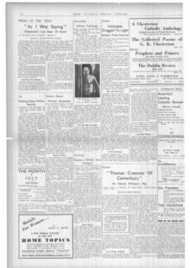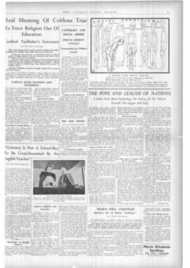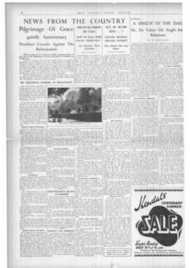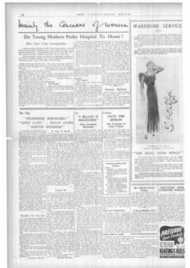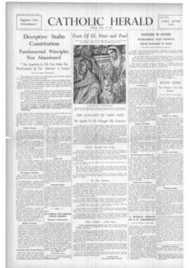Page 7, 26th June 1936
Page 7
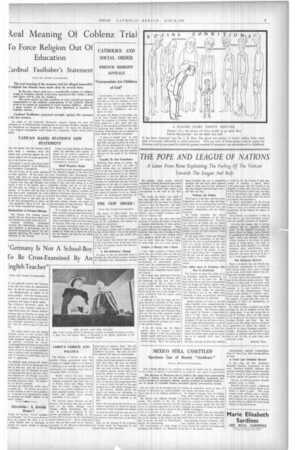
Report an error
Noticed an error on this page?If you've noticed an error in this article please click here to report it.
Tags
Share
Related articles
Letters To The Editor
No More 'no Popery'?
" Italy And The War Mind"
Animal Liberation Now Tomorrow May Well Be Too Late
Molotov Cocktails Thrown After Fascist Audience
THE POPE AND LEAGUE OF NATIONS
A Letter From Rome Explaining The Feeling Of The Vatican 7owards 7he League And Italy
SIR,—During recent events, several responsible Catholic periodicals have taken a point of view with regard to the League of Nations and Fascist Italy which is in contradiction to the view of the Vatican.
This would not matter very much if they had explained that their opinions were personal and not meant as interpretations of what the Pope felt. But when they neglected to do this they were naturally taken as Vatican spokesmen and have misled a lot of English Catholics about what the Vatican feels.
And, worse than this, there have been instances of twisting the Pope's words into a disguised condemnation of Italy and approval of the League of Nations. There is good authority for believing that this behaviour has been very irritating to Vati can circles. I have been talking with some people in Rome who are in a position to know what the Vatican thinks on broad lines; and it is worth saying it.
League, a Danger and a Snare
I don't think anybody in Rome could doubt that the Vatican does not like the League of Nations as it is constituted at present. The Pope's own opinion is that non-Catholic or anti-Catholic governments have the preponderating influence at Geneva, and as a result the League of Nations may be a disguised weapon against the Church.
The Vatican never approved of the constitution of the League of Nations, from the beginning, but has now very little, if any, sympathy with it, owing to the strong position which Soviet Russia has come to occupy in it. As long as Soviet Russia plays any part in the League, it is quite unthinkable that the papacy could co-operate with it.
In addition to this the Pope and Cardinal Pacelli are disturbed by the victory of the Front Populaire in France—as well as the threat of a socialist dictatorship in Spain—and as France and Protestant England are the two other countries besides Soviet Russia which "run" the League of Nations, it is obvious that the Pope cannot see anything but a danger and a snare in the present League.
I am not saying that the Pope's opinion need be accepted as final, though I think it is the only reasonable opinion myself and I know that it is the opinion of the majority of Catholics in Central Europe. But I am saying that those Catholics who are in responsible positions and who have other opinions ought to make clear in their utterances that they disagree with the Pope's view— and then say why.
Vatican not Italian
With regard to the Pope and Italy many Englishmen seem to have been led hopelessly astray by not distinguishing between the Vatican—an extra-territorial state and completely independent—and the Italian hierarchy.
The Italian hierarchy has shared throughout the enthusiasm of all other Italians for the Abyssinian war. The Vatican, which is not Italian, has not shared this enthusiasm, and has tried to keep it within bounds, e.g., by forbidding the bishops to give up their pectoral crosses to the government.
At the same time I think the Vatican has viewed this enthusiasm of the hierarchy for the war as understandable, and seen it as almost inevitable in any war that the hierarchy should share the feelings of the rest of the people. It may not be a good thing, but it happened in the last war, and we must remember that the Vatican has a longer memory than most of us and more experience of human nature.
Not called upon to Condemn this War in Particular
The Vatican no more felt called on to say something applying immediately to this war, than to any other war. But I don't think that at any time it sympathised with the League of Nations against Italy. The concordat between the Church and the State in Italy, unlike the concordat mith Germany, has on the whole been successful, in spite of periodical quarrels About such questions as education.
Being in Rome it is clear to me that some Catholics have exaggerated ludicrously the tension between the Church and State in Italy. The Vatican's policy with regard to Fascism is opportunist, and it is fully aware that Mussolini would not give anything for Catholic principles if it did not suit him to do so. At the same time Catholicism is granted more liberty in Fascist Italy than in Liberal France or Spain, or Nazi Germany; and few European governments allow the Church more scope for carrying on its essential work than the Italian.
We have only got to think how difficult
it would be for the Vatican if Italy had, instead of Fascism, a liberal democratic government like the French or the Spanish, to realise that from the viewpoint of Pius XI Fascism is better than any other sort of government that might possibly take its place, and better than the liberal government that preceded it.
A liberal government on the French model might attempt to expel the religious orders, or carry on a violent and sectarian persecution of the Church by means of education.
The Catholic, as a Catholic, is freer in Italy than in any great European country with the possible exception of England.
It is for this reason that a serious authority like Fr. Agostino Gemelli, rector of the Catholic University of Sacro Cuore, in Milan, views Fascism as a godsend to the Church in Italy; and many Swiss and Austrian Catholics, without ceasing to be critical of some aspects of Italian policy, view Italy as one of the stable elements in a Europe becoming more anti-Christian, more sectarian, and more unsure every year. This does not mean that there is not a lot of stark pagan pride in Fascism.
The Religious Revival
There is no doubt that the Church has considerably strengthened its position in Italy during recent years, and is making up for some of the losses which it has suffered since the Risorgimento.
It is true that in the universities a good deal of the old sectarianism remains. But whereas in times gone by the more virile and energetic young men would have been ashamed to be seen anywhere near a church (with that "human-respect" which always causes trouble in "Catholic" countries) to-day you cannot help remarking the number of young men who pray unashamedly at Mass or Benediction, Of walk in processions.
No visitor to Italy at present can avoid noticing the sort of religious revival that is taking place. I am not saying this in praise of Fascism, and I am fully aware of the dangers of too close an association between Church and State. But this respite from the almost normal condition of persecution in which the Church is placed in so many European countries— whether democratic or dictatorial—may enable it to entrench itself so well in Italy that it will be able to resist rainy days when they come.
BERNARD WALL.
blog comments powered by Disqus


